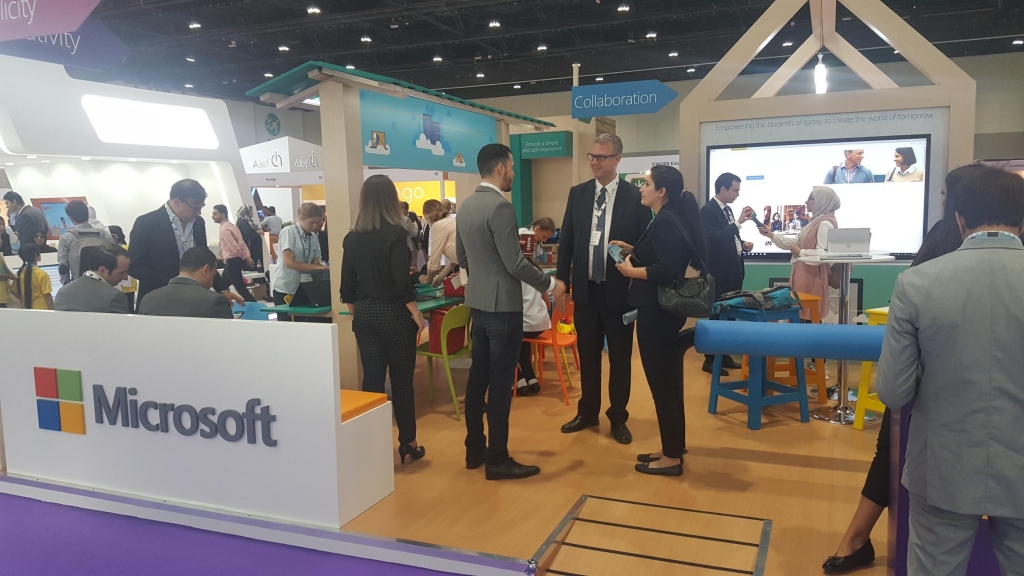
Microsoft demonstrates power of collaborative learning at BETT Middle East and Africa 2018
Microsoft today marked its presence at the BETT Middle East and Africa (MEA) Leadership Summit and Expo for the third consecutive year, further highlighting the company’s deep commitment to regional education, employment and economic development.
Taking place on 23 - 24 April, under the patronage of His Highness Sheikh Hazza bin Zayed Al Nahyan, Vice President of the Abu Dhabi Executive Council, this will mark the first year BETT MEA has been held at the Abu Dhabi National Exhibition Centre (ADNEC). Acting as Worldwide Partner for the series, Microsoft demonstrated its commitment to empower every student and teacher to achieve more, by showcasing the power of its products and solutions in digitally transforming classrooms.
From its popular devices and productivity apps, to next-generation education solutions incorporating mixed-reality capabilities, Microsoft illustrated the changing role of technology in the classroom. To give educators the full power of the Microsoft ecosystem the company also showcased Microsoft 365 Education, which brings together Office 365, Windows 10, Enterprise Mobility + Security and Minecraft: Education Edition in a single, affordable solution built for education.
With mounting pressure on educational institutions to continually improve student achievement and prepare them with skills they’ll need when they enter the workforce, the aim of Microsoft 365 Education is to get schools up and running faster through simplified acquisition and deployment. This improves time efficiency and delivers new capabilities to teachers and students to help them learn and work in new ways. The company enlisted the aid of real students from the Microsoft Showcase Schools programme to help run the demos at its BETT MEA 2018 stand and show that collaborative learning models can help to build much-needed soft skills, such as emotional and social aptitudes.
“New approaches to learning, from mixed-reality solutions to hands-on lesson plans, provide students with the rich, immersive, collaborative experiences they need to ignite their innate curiosity and creativity,” Said Ahmed Ameen Ashour, Education Director, Microsoft Gulf. Microsoft has long been committed to prepare our young people for the digital future they face. Our continued efforts will ensure they are equipped with the right skills to create the world of tomorrow. Our Presence at BETT MEA for the third consecutive year, reiterates our commitment to continue driving important discussions between policymakers, school leaders and educators in the region. Together we aim to discover the joint initiatives required to deliver truly student-centric approaches to education and underpin future employability and economic growth.”
This year’s BETT MEA hosted 2,500 educators, policy-makers, thought-leaders, stakeholders and technology specialists, who came together to share their views on how to improve learning outcomes across the region. In addition to the technology showcase, Microsoft also participated in panel discussions, presentations and keynote addresses. Anthony Salcito, Vice President of Worldwide Education at Microsoft, in his keynote address spoke about how learning has transformed in today’s era and so has the modern workplace; and highlighted the importance of driving change in teaching and learning models, thus preparing students for the future workforce. Salcito’s keynote also shed light on the recent Mckinsey “Class of 2030” report that reveals how students want to develop the skills to navigate their own learning, and the need for personalization versus automation. Furthermore, he also talked about the role of cutting-edge technologies such as Artificial intelligence, Mixed Reality and Quantum computing, and how they contribute to transforming teaching and learning in increasingly innovative ways.
McKinsey's “Class of 2030” report – encompassing input from 2,000 students, 2,000 teachers and 70 thought leaders worldwide – revealed that children starting school now would be better prepared for the post-Fourth Industrial Revolution workplace if they were endowed with social and emotional skills. Only 42% of employers believe that today's graduates are adequately equipped with those attributes.
The study showed that up to 40% of jobs in growth industries required soft skills and that emotional and social attributes were twice as predictive of a student's academic results as home environment and demographics. More than 98% of students expressed a desire for more personalisation in the classroom, as opposed to automation, revealing a need for teachers' time to be freed up. Teachers, on average, said the right technology in the classroom gave them 30% of their time back, allowing them to deliver more student-centric education.
“The role of technology in the classroom is changing dramatically, from the simple automation of processes and digitization of content to a full-fledged partner in the enhancement of student engagement. The Fourth Industrial Revolution has produced a proliferation of new educational models designed to fulfil the demands of the smart society, in which the future workforce must be capable of complex problem-solving, creativity and critical thinking.” Added Ashour.
Sonal Ghelani, Event Director Bett Middle East & Africa said “The UAE has always taken pride in delivering inspirational educational curricula that are centred around excellence, innovation and progression. Bett underpins the nation’s ambitious vision to become the leading education destination in the world, as outlined in the UAE Centennial Plan 2071.”



























